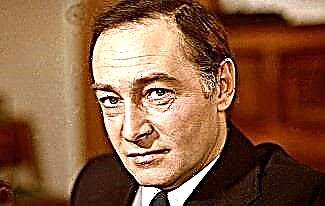Lucius Annay Seneca, Seneca the Younger, or simply Seneca - Roman Stoic philosopher, poet and statesman. Educator of Nero and one of the outstanding representatives of stoicism.
In the biography of Seneca, there are many interesting facts related to philosophy and his personal life.
So, before you is a short biography of Seneca.

Seneca's biography
Seneca was born in 4 BC. e. in the Spanish city of Cordoba. He grew up and was brought up in a wealthy family that belonged to the horse class.
The philosopher's father, Lucius Anneus Seneca the Elder, and his mother, Helvia were educated people. In particular, the head of the family was a Roman horseman and rhetorician.
Seneca's parents had another son, Junius Gallion.
Childhood and youth
At an early age, Seneca was brought by his father to Rome. Soon the boy became one of the students of the Pythagorean Sotion.
At the same time, Seneca was educated by such Stoics as Attalus, Sextius Niger and Papirius Fabian.
Seneca Sr. wanted his son to become a lawyer in the future. The man was glad that the boy learned different sciences well, was erudite, and also had excellent oratorical skills.
In his youth, Seneca became interested in philosophy, however, under the influence of his father, he planned to connect his life with lawyer's activity. Obviously, it would have happened if not for the sudden illness.

Seneca was forced to leave for Egypt to improve his health there. This upset the guy so much that he even thought to commit suicide.
While in Egypt, Seneca continued to educate himself. In addition, he devoted a lot of time to writing natural science works.
Returning to his homeland, Seneca began to openly criticize the current system in the Roman Empire and statesmen, accusing the latter of immorality. During this period of his biography, he began writing works related to moral and ethical problems.
State activity
When Caligula became the ruler of the Roman Empire in 37, he wanted to kill Seneca, because he was extremely negative about his activities.
However, the emperor's mistress interceded for the philosopher, saying that he would soon die due to illness.
When Claudius came to power 4 years later, he also intended to end Seneca. After consulting with his wife, Messalina, he sent the disgraced speaker into exile to the island of Corsica, where he had to stay for 8 years.
An interesting fact is that the freedom of Seneca was presented by the new wife of Claudius - Agrippina. At that time, the woman was worried about the ascension to the throne of her 12-year-old son Nero, after the death of the emperor.
Agrippina was worried about the son of Claudius from his first marriage - Britannica, who could also be in power. It was for this reason that she persuaded her husband to return Seneca to Rome, so that he would become Nero's mentor.

The philosopher was an excellent educator for a young man who, at the age of 17, became a Roman emperor. When Nero began his reign, he granted Seneca the post of consul, and also honored him with the status of an all-powerful adviser.
And although Seneca gained a certain power, wealth and fame, at the same time he experienced a number of difficulties.
Lucius Seneca was completely dependent on the despotic emperor, and also disgusted the common people and the Senate.
This led to the fact that the thinker decided to voluntarily resign in 64. Moreover, he transferred almost all of his fortune to the state treasury, and he himself settled in one of his estates.
Philosophy and poetry
Seneca was an adherent of the philosophy of Stoicism. This teaching preached an indifference to the world and emotions, apathy, fatalism and a calm attitude to any turns in life.
In a figurative sense, stoicism represented firmness and courage in life's trials.
It is worth noting that Seneca's ideas were somewhat different from the views of traditional Roman stoicism. He sought to understand what the universe is, what governs the world and how it works, and also explored the theory of knowledge.
Seneca's ideas are well traced in Moral Letters to Lucilius. In them, he stated that philosophy first of all helps a person to act, and not just think.

Lucilius was a representative of the Epicurean school, which was very popular in ancient times. At that time, there were no such opposite philosophical schools as Stoicism and Epicureanism (see Epicurus).
The Epicureans called for the enjoyment of life and all that gives pleasure. In turn, the Stoics adhered to an ascetic lifestyle, and also tried to control their own emotions and desires.
In his writings, Seneca discussed many moral and moral issues. In On Anger, the author spoke about the importance of suppressing anger, as well as showing love for one's neighbor.
In other works, Seneca talked about mercy, which leads a person to happiness. He emphasized that rulers and officials especially need mercy.
Over the years of his biography, Seneca wrote 12 treatises and 9 tragedies based on legends.
Also, the philosopher became famous for his sayings. His aphorisms still do not lose their relevance.
Personal life
It is known for certain that Seneca had at least one spouse named Pompey Paulina. However, it is entirely possible that he could have had more wives.
Almost nothing is known about Seneca's personal life. However, the fact that Paulina was really in love with her husband defies any doubts.
The girl herself expressed a desire to die with Seneca, believing that life without him would not bring her any joy.
Death
The cause of Seneca's death was the intolerance of the emperor Nero, who was a pupil of the philosopher.
When the Piso conspiracy was discovered in 65, the name of Seneca was accidentally mentioned in it, although no one accused him. However, this was the reason for the emperor to end his mentor.
Nero ordered Seneca to cut his veins. On the eve of his death, the sage was absolutely calm and calm in spirit. The only time he got excited was when he began to say goodbye to his wife.

The man tried to console Paulina, but she firmly decided to die with her husband.
After that, the couple opened the veins in their arms. Seneca, who was already old, was bleeding very slowly. To speed up the flow, he opened his veins and legs, and then entered a hot bath.
According to some sources, Nero ordered Paulina to be rescued, with the result that she survived Seneca for several more years.
This is how one of the most famous philosophers in human history died.









